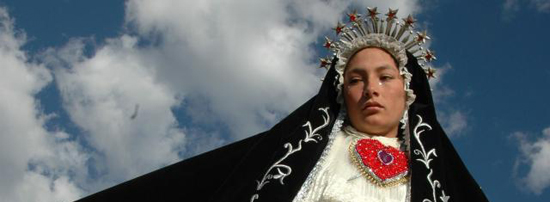
Preview of BFI South American Renaissance film festival
07 August, 2010In recent years there has been an explosion from the South American film industry. Headed up by the internationally acclaimed City of God, the continents film makers have been making noises the rest of the world can’t fail to hear. The BFI’s South American Renaissance festival is showcasing some of the best work of the last decade to come out of the continent. The selection of films traverses every aspect of South American culture and life. From the dark, criminal underbelly of the cities comes City of God, a gangster film so successful it is now studied in school (a sure way to ruin a whole generation’s enjoyment of the film!) Nine Queens, and Lower City. The latter a, “Sexy love-triangle drama, set amongst the hustlers, criminals and prostitutes of Brazil’s colourful port city Salvador”. In honour of South America’s conquistador roots the epitomical road movie features prominently in this selection with 5 of the 20 films. The director Walter Salles is responsible for two of the more well known of the films, Central Station, where a bitter, retired teacher is forced to accompany a young orphan on his mission to find his father, and The Motorcycle Diaries, Salles’ interpretation of the diaries of a young, pre-revolutionary Ernesto ‘Che’ Guevara as he travels across the continent, in search of the ordinary people of South America. The journeys undertaken are always spiritual and emotional as well as physical, and the slow pace of these films allows the audience to be dazzled by the beautiful, infinite and changing landscapes of the South American countries. The Quixotic spirit is alive and well in South American film-making, enticing the viewer to this fascinating land.
The other films in this selection show the diverse nature of South American film-making. With so many documentaries made in South America, we can become saturated with the “plight of the people” so I was very pleased to see that the two documentaries being shown are unique and gritty. The Blondes is Argentinian director Albertina Carri’s search for her ‘disappeared’ parents and Bus174 presents what happened when a street kid hijacked a bus in Rio de Janeiro and the ensuing police blunders leading to chaos after.
Bus174
The renaissance celebrates the continents best filmmaking of the last decade. I think this is why they chose to include more obvious and popular films, such as City of God and The Motorcycle Dairies. These films have set the mark for current South American filmmakers and as well as showing the popular, modern classics this festival also rejoices in the diversity and wealth of what South American film has to offer the world. Human stories that can resonate with the global community.
Set in an extremely rural part of Peru, where you must walk for 3 days to find a telephone and strangers rarely come, Madeinusa tells the story of an outsider stranded in a village during “Holy Time””, the time between the crucifixion at 3pm on Good Friday of Jesus and his resurrection on Sunday morning. A time when God is dead and sin goes unnoticed by Him. During this time, dutifully kept by an ancient man flipping numbers, the villagers partake in the ultimate bacchanal revelry. During the annual celebration the villagers hold a wife swap, the recently deceased are dug up and plied with booze, people dance in suits made of fire works and incest is fully supported by the village community. People may find this film shocking, and indeed you come away either loving it or hating it. There are no blushes spared, bodily fluids are openly examined and discussed, and for the villagers what goes on in ‘Holy Time’ is not wrong or unusual. The audiences allegiance is with the outsider, Salvador, who expresses our opinions on screen, exclaiming “this is crazy” on more than one occasion during the film. Despite his condemnation of the event he too succumbs to his own desires.
Madeinusa
The decision to set the film in a remote, indigenous village works. If it was set in a city it would be disgusting and sleazy without any of the innocence of the characters. By setting it in the context of an out-of-the-way, pious village, hardworking and reverent for the rest of the year, their extreme, debauched revelry matches the fervour with which this community live their lives. It is a far cry from our, and Salvador’s, world of technology where gratification is instantaneous. For the villagers in this film, ‘Holy Time’ is their passport to pleasure, so it makes sense that it should be as wild and uninhibited as possible. For a ‘free thinking’ Western audience it is shocking to see people acting out their most base desires, but when presented as an annual celebration the depravity is lost and we can see it as an exploration into human desires.
Dates and times for all the films being shown can be found . All films are showing at BFI Southbank. Directions can be found here.
More info:
BFI website
Follow Sounds and Colours: Facebook / Twitter / Instagram / Mixcloud / Soundcloud / Bandcamp
Subscribe to the Sounds and Colours Newsletter for regular updates, news and competitions bringing the best of Latin American culture direct to your Inbox.

